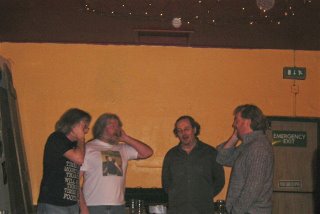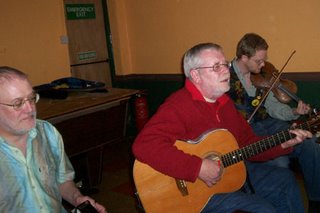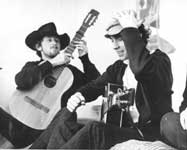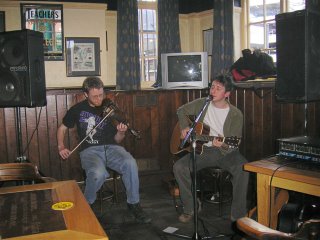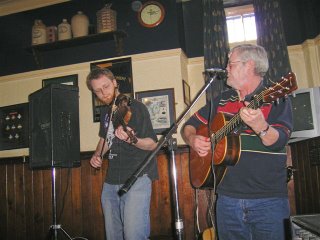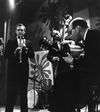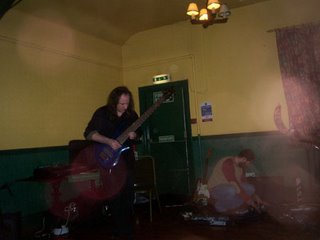
Roger Bullen – drums & bent drums, electronics/Anthony Donovan – 6 string bass, keyboard, laptronics, contact mic, electronics/Lee Mapley – guitarsynth, bent drums, electronics - are The Murmurists and come from the Northampton area – where there is a rather good club devoted to improvised music run by the Liquidiser crew and with whom a couple of this band perform occasionally. But they are very much a band in their own right and perform totally different music to what I have previously heard down at the Northampton Labour Club. Loud, for a start... This is the embrace of the Electronic Frontier with a vengeance, leavened with a stripped down acoustic drum kit – well, snare and cymbal – whose acoustic sounds can also be processed by Roger Bullen's attached little black box. Two guitars, one a six string bass that gives Anthony Donovan the ability to play from way down deep to high up the top two strings, the other a guitar synth played by Lee who, alongside Roger Bullen also plays what they term – 'bent drums'- warped pedals/circuit bending/drum machine noise terror. Add a couple of laptops and a ritzy looking keyboard and some electronics... you have the ingredients for mighty and complex music. They reference rock, of course, and electronica areas with implicit bent drum beats that edge in and out like a pulse track and the more jazzy Bullen acoustic drum rhythms. But the music is, in the main, defiantly non-idiomatic and they create a long, ever-changing soundscape, playing for over an hour but never flagging – which is no mean feat. This is music that is cinematic in scope, with broad sonic vistas, rolling clouds of feedback and noise alongside quite delicate episodes where more conventional chords and melodies are brought in and out. The rhythms clatter and bang acoustically and electronically although the snare and cymbal get a little drowned at times – this may be the ambiance of the room as well, perhaps the kit should have been further forward – but this is a minor quibble. Given that the sophistication of their equipment was being channelled through an albeit redoubtable Carlsboro PA of the same vintage that I used to use twenty years ago, the sound stood up well. Both Anthony and Lee also process live on the fly, feeding snatches of guitar into their laptops to add another level of complexity – the live sounds then being mutated and processed back into the mix.
Anthony stands at the front to stage right, toting a six-string bass guitar, on the table next to him by the wall are his keyboard and laptop and a bank of electronics. Lee to his left and slightly behind him. Roger stage left alongside Lee – between these two is a pile of 'bent drum' equipment on the floor with Roger's snare/cymbal set-up at the far stage left. He switches between sitting at his acoustic kit and kneeling on the floor to process his rhythms. Lee stands with his guitar, manipulates his laptop, or also squats to play his selection of 'bent drums.' The movement of the band between their instruments is continual and acts as a figure to mirror the wide spaces and movements in the music. I've seen a lot of musicians eschewing the traditional stage postures over the last year or so. Vibracathedral Orchestra seemed to spend most of their time sitting on the stage attending to their intruments when I saw them the other week – well, heard them, as I couldn't see them very well at all, given the crowd. Which made listening to the music interesting because there was no visual frame of reference – similar to the Jandek concert last year at St Giles where I couldn't see what he was playing but had to rely on my guitar knowledge – which made for a more intense experience. It brings to mind some kind of work ethic, that the musicians are busy in their various stage tasks, also a subversion of conventional stagecraft, but it's a natural scenario not a studied pose – we do it in the Plexus group as we also play very long sets and switch between instruments so the music is often being held with a laptop loop/vamp while one of us wanders off for a piss while another picks up a guitar or as I did last week: disappear and leave my cohorts to continue as I went to buy a drink and ended up in a bizarre conversation in the bar and had to suddenly rush back to my laptop duties. (I don't think I was missed anyway...). Or just wander around the room to sound out the acoustics of the occasion from a different angle...
During their performance I scribbled loads of notes trying to describe the music as it progressed: they are as usual almost undecipherable. But a stripped down mix as follows:
Really, they have a very original sound. They fool you because at first glance they look more 'rocky' due to the visual line up and expectation of drums, bass and guitar (synth). But this is soon subverted in a clever blend of timbres and rhythms – where a steady pulse surfaces as a reference it will be buried quickly in dense sound. This supplies a degree of continuity but does not overly rely on repetition and the live drumming gives an organic feel to the rhythms. They go in and out of noise and feedback: an organ style chord or two emerges sporadically, to be counterpointed by raw saw-edged sounds and and an echoing deep loop – then steely bass notes (from the keyboard?) spattered briefly into the fray as the electronic tones rise in volume accompanied by pattering snare played with brushes throughout to die away again to a distanced bass throb as a higher organ patched sound line of long held notes rises and takes centre stage underscored slowly by deeper organ drones.
The Murmurists move their improvisations through time (in both sense – rhythmic and temporal – the two interlinked of course) and space with intense and dense strategies. And space is the key to understanding and playing long form improvisations (or compositions – the formal concerns are different, up to a point, but the concentration required is the same – i.e a lot). The longer you play, for example, the more harmonic space there is to resolve chromatic complexities. ( I remember a classical musician explaining once that Wagner's works became longer as they became chromatically more radical due to the length of time and space needed to resolve the harmonies. Long improvisations give the artists time to breathe – not that there is some interdict from the Noble House of Warner against shorter forms – 'by any means necessary' is my appropriated motto. But I don't see a performance such as this as muso indulgence – listening to the playback I can really hear again (albeit imperfectly as my mini-disc was just a bit too close to the action and distorts majestically at times – what the hell, keep the accidents in...) the way this piece flowed and established its own long trajectory: which requires - the length it is. Or let's get Zen and say that 'how long is a piece of string' could be the détourné koan for tonight. I loved it... and on one of those days when earlier running a club seemed a chore I could have done without (all who run spaces like ours know what I mean...), mainly due to on-going health reasons and also, to be honest, because of over-indulgence the night before at a folk gig I went to instead of going to see The Fall (see my other review – I get around...), let's just state that the music made it all worth while. Which is why we go on... I can't go on...
I'll go on... Etc... The organiser's motto - sorry, curator, we calls them now...
I figure that the point at which the performance started to arc down to conclusion was a small section where Anthony played a couple of two note motifs – fourths, B to E, A to D it sounded like but don't quote me – then repeated and elaborated on briefly. Very soon Lee left the stage to the other two – bass thrumming repeated figures as Roger manipulated his black box – Anthony then – synth noises – keyboard – fast strummed bass again into slowly changing note – into ending...
At which point I checked the time and realise in surprise that they had been playing for just over an hour non stop, with no flagging of invention of saggy bits... No mean feat...
David Teledu pointed out earlier that outside of London there is a route of improvising/experimental clusters along the M1 going North – Northampton, Market Harborough (Black Carrot), Loughborough – us – the Club Sporadic – Nottingham and then up to Leeds and Sheffield. A ley line for the diffusion of musical energies outside of the capital. There's a lot going on out here – the Murmurists are a prime example of the quality of music and the experimental adventures that can be found in the Midlands, an area which gets overlooked sometimes as attention focuses on the polarities of north and south. May they flourish. And: the Club Sporadic is putting on an all day festival in May, Saturday 27th, to be exact. Ther Murmurists are coming back to play and I look forward to hearing them again. Get the cd's out there, boys...
